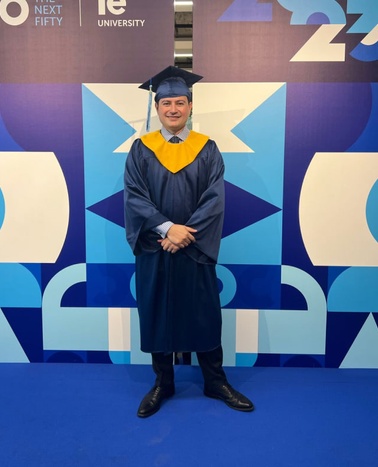
Alejandro Peñafiel
My professional experience has been a progression of being open to opportunities. I started working while studying at a university in Washington, D.C. My program required that I find an internship, leading me to work for the Republican National Committee and the John McCain presidential campaign.
I then moved to London to pursue a finance job and ended up working for an energy trading platform in sales and business development. While there, I also started studying for the CFA exam, which positioned me to specialize in asset valuation for oil and gas exploration and development within my family’s energy business. It later led to me becoming the interim CFO of a small cap-listed Canadian oil and gas company with shale oil assets in Argentina.
After we exited that investment, I spearheaded the acquisition and integration of an Italian oil and gas company, which overlapped with my Executive MBA. I launched a search fund after graduation, and I’m working on closing an acquisition of a Spanish SME in the MedTech space.

“I knew that the Executive MBA was the best fit for me as I didn’t have to take a break from my career to pursue it.”
What inspired you to join the Executive MBA?
My role as interim CFO ended right before the world shut down due to the pandemic, which gave me time to reflect on my future. Before that, I had researched MBA programs on and off for almost a decade—it was always my long-term ambition. IE Business School has a great reputation, especially in Europe and Latin America, but I had aged out of the full-time MBA profile. That’s when I knew the Executive MBA was the best fit for me as I didn’t have to take a break from my career to pursue it.
How did the Executive MBA meet or exceed your expectations?
The program exceeded my expectations in many ways as I underestimated its transformative nature. Going into it, I had more of a tick-the-box mindset, thinking I’d put in some time and effort, get a good network and add another credential to my resume. However, the reality of the program completely changed my outlook and how I approach my career and business in general. The Executive MBA is a calibrated process with a massive impact, but only if you’re willing to invest the time and embrace the experience.
What’s the greatest challenge you faced during your Executive MBA?
My biggest challenge was balancing all my commitments—personal, work and the Executive MBA. My wife and I had two young children and, on top of that, I had to travel frequently for work. This created many difficult weeks where every part of my life got busy at the same time. But for me, it boiled down to the commitment to myself and my cohort to get the most out of the experience.
What did you learn in the Executive MBA that you’ve applied in your current role?
One of the most valuable tools I learned in the program was how to conduct a 360-degree feedback exercise. It’s tough to accurately assess how others perceive us and our communication styles, so this has helped me improve my managerial skills and team performance. I also plan to implement this exercise regularly, as having a well-functioning executive management team is crucial to executing your business plan.
What did being chosen as your cohort's “Most Innovative Student” mean to you?
I was very pleased to be recognized by my peers, who are all very accomplished professionals. It felt special since we got to know each other throughout the program. I was also surprised, because my mind always associated innovation with technology. But my classmates chose me because they thought I consistently found new and creative ways to pick projects or solve problems.
You’ve said that the Executive MBA helped you discover what you “didn’t know that you didn’t know.” Can you elaborate?
In retrospect, it is much easier to see that improving your skills isn’t the primary purpose of the Executive MBA. While it’s part of the process—and I have gained many new skills and honed existing ones—the program’s real value lies in coming into contact with ideas, concepts and people that you would have never been exposed to without the Executive MBA.
In my case, even though I had completed Level II of the CFA and had public market experience, I still didn’t know that search funds even existed. No amount of self-study would have helped me discover this asset class because it was something I didn’t know that I didn’t know. The Executive MBA provided me with a structured way of exploring and allowed me to discover new things, which is what made the program such a transformative experience.
In your opinion, what makes the Executive MBA so special?
It’s a mixture of things. While you get the book knowledge mandatory for any MBA, you’re also taken through a process that challenges and stretches you. You do all this in the company of a great group of experienced professionals who share this journey with you. It’s one of those things where the end result is much more than the sum of the parts, and IE Business School does a great job of facilitating a transformative experience.
What advice would you give to anyone considering applying for the Executive MBA?
The best investment anyone can make is investing in themselves. This is even more true today, given the knowledge economy and the disruption we continue to witness. There will never be a convenient time to add the extra academic workload on top of your existing commitments, so if you want to bet on yourself, do it anyway. Also, try to get the most out of the Executive MBA as it goes by quickly.